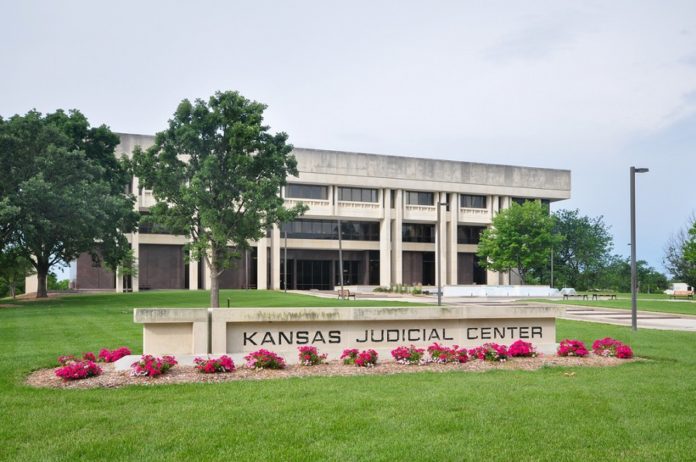The Kansas Supreme Court could potentially throw out the entire legal dispute over the state’s new emergency management law without addressing the overriding question of whether it’s constitutional.
Late last week, the court quietly issued an order asking the lawyers in the case to address whether Kansans must make a timely request for a school district hearing to challenge a health order before they can go to court.
The briefs must be filed by Oct. 4.
The court’s order potentially telegraphs how the justices are viewing the legal challenge to the state’s new emergency management law, which a lower-court judge threw out because it was unconstitutional.
The court’s order seems to suggest that the justices might decide the case on standing – did the plaintiffs suffer harm from the order – rather than the overall constitutional issues raised by a Johnson County judge, leading lawmakers said.
A narrow decision on standing could potentially rescue the entire new emergency management law, which has been in limbo in recent weeks.
“If the case is thrown out on standing, then the ruling on the validity of the statute would disappear and it would be as if the suit were never filed,” said University of Kansas constitutional law professor Richard Levy.
A Johnson County judge found that the law violated the separation of powers between branches of government and the due process rights of government because of a provision allowing Kansans to challenge state and local health orders in court.
The Supreme Court last week homed in on part of the law requiring challenges to a school district health order to be filed with the district within 30 days of the order being issued.
School boards were required to hold a hearing within 72 hours of receiving the challenge and the aggrieved parents or students would have 30 days to go to court if they wanted to appeal the school district’s ruling.
The court’s request goes to the issue of whether the original plaintiffs in the case filed their challenge with the district within the 30 days provided for by law.
Republican state Rep. Fred Patton, chair of the House Judiciary Committee, noted that the plaintiffs in the case challenged an order issued by the Shawnee Mission School District in July 2020.
The court challenge to the district’s health order, which included a mask mandate, was brought on May 28, 2021.
It was filed about nine months beyond the 30-day limit established by the new emergency management law for bringing grievances against a health order.
“I think that’s what the court is getting at,” Patton said.
“I’m wondering if the court says that the plaintiffs in the very beginning didn’t have standing to bring this case…so we don’t get to the constitutionality issue,” he said.
The issue was raised in district court where Judge David Hauber noted that the complaint challenging the order was in response to a May 6, 2021, email from the school district denying the plaintiffs’ request for a hearing.
“The email is not an ‘order or ‘policy’ or ‘action’ itself, but an acknowledgment that the district is doing nothing new and there is nothing to ‘hear,'” Hauber wrote in a June 8 opinion.
“The plaintiffs have not identified any action, order or policy occurring within the past 30 days,” he ruled.
Hauber further noted that the law setting out a grievance procedure for school health orders was enacted long after the Shawnee Mission School District passed a resolution affirming its classroom reopening plan.
“The law is not retroactive and cannot be reasonably interpreted to address anything more than a change in policy or an individual application that demonstrates a harm plaintiffs have failed to idenfity,” he ruled.
Patton speculated that the court might shy away from the constitutionality issue.
“I think the court appears to be looking for a way to not get to the constitutionality.”
The grievance procedures for schools are no longer in place. They expired last summer when the lawmakers refused to extend the governor’s emergency disaster declaration.
Democratic state Rep. John Carmichael, the ranking member on the House Judiciary Committee, saw the court’s order similarly.
Under the emergency management law passed earlier this year, the Wichita lawmaker said it appears that a strong argument can be made that requesting a hearing before a school board is a prerequisite to filing a lawsuit challenging an order.
“The court may be inclined to throw this out because of a failure to exhaust administrative remedies which leaves the court without jurisdiction to hear the civil lawsuit – at least under this statute,” he said.
“The courts avoid holding a statute unconstitutional if there is another way to dispose of the case,” Carmichael said.
“If there is a procedural argument…to be made that a hearing was not requested within the time provided for in a statute, a court will decide the case on that basis before the court reaches out to say a particular statute is unconstitutional.”












